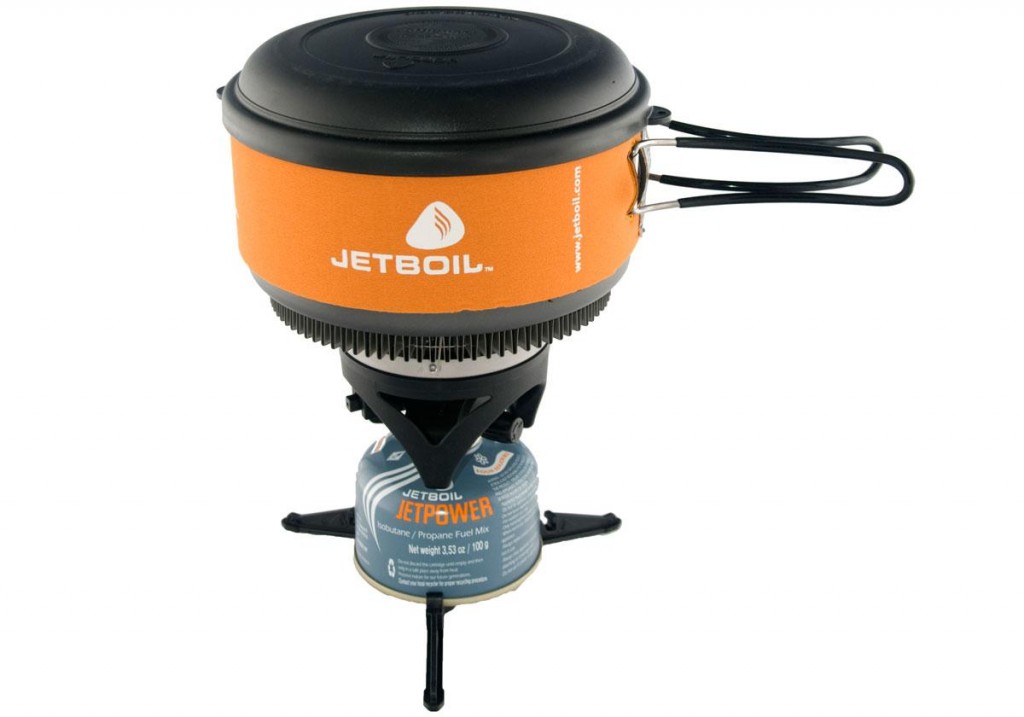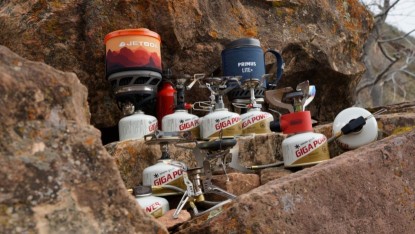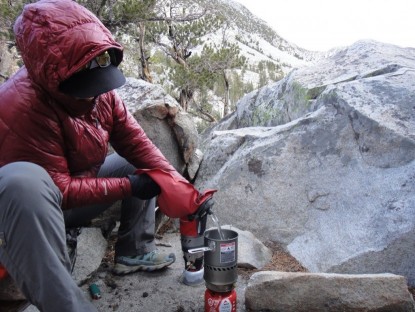Likes
Boiling nearly 12 liters of water with a 100g fuel canister, the Jet Boil GCS is one of the most efficient stoves we tested. The 1.5-liter hybrid pot is also a decent fry pan, meaning that you only need the included pot to cook up most meals. Our favorite feature of the GCS was its versatile pot covers. These can double as plates, shallow bowls, or cutting boards. The pots top cover snaps on relatively securely, enough to store food.
This stove is compatible with the light and compact JetBoil Hanging Kit ($30 extra) which turns this into a hanging stove. The kit also works with other JetBoil stoves, including the Flash.
Dislikes
While the GCS may be highly efficient, its terribly inept at boiling water in windy conditions. In an 8mph wind the GCS boiled one liter of water 2.16 and 5.78 times slower than the Jetboil Flash and MSR Reactor, respectively. This sluggish 18-minute effort thoroughly negates any efficiency benefits gained in low wind conditions and makes the stove better suited for forested campgrounds than alpine conditions.
Most of the stoves we tested had easy-to-use control valves. Unfortunately, this was not the case with the GCS. The small snub-nosed black knob on this stove is the shortest control valve of any stove tested here. This makes the stove hard to use and puts your fingers closer to the burner and beneath dangerously hot liquids. Jetboil has addressed this problem in an upgrade to the Flash, but they have yet to do the same with the burner on the GCS.
While we believe the included pot is versatile for cooking, its shape makes packing the stove inside rather awkward. When underway, the burner, legs, and canister support rattle and bang like a middle school band. We recommend either packing a 100g fuel canister in the pot (the 230g canister does not fit with lid closed), or adding some other type of padding.
We mentioned that the stoves plastic covers are great for eating off of, but they proved ineffective at serving as pot lids. Not only was the top cover difficult to remove, it started melting when we used it as a lid for boiling water. We believe a pot without a lid is a pot not worth having.
Additionally, we found the GCS to be the least stable of the integrated stoves we reviewed. Both the MSR Reactor and the Jetboil Flash were more stable.
Our final complaint with the GCS lies with its weak legs. These thin implements unfold and slide onto on the stove burner, extending and complicating the stoves setup. While the legs did not break during testing, we believe the design is both cumbersome and weak.
This is the heaviest integrated stove we tested.
Best Application
Due to its inability to withstand windy conditions we believe this stove is best suited for backpacking in forested areas.
Value
Your money can go further elsewhere.
Other Versions
Jetboil also makes the hugely popular and well-designed
Jetboil Flash. In an attempt to cut costs they chose to use the same burner unit with the GCS. While we think the concept of the GCS is great, the burner needs a redesign in order to make this a viable stove.




